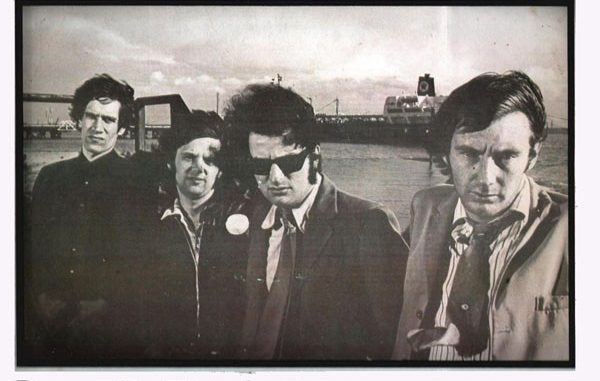
This week Tim Martin steps up to argue the case for an Americana tag for an outfit not normally associated with the genre. He’s chosen to opt for a band with deep connections to the delta country – the Thames delta, that is.
In the melting pot of the early seventies London area music scene that was loosely called “Pub Rock,” there were bands who drew on many types of American roots music. Brinsley Schwarz were influenced by The Band, and especially Eggs Over Easy an American country rock band, who visited Britain to record an album and stayed to play at The Tally-Ho, which became Ground Zero for the Pub Rock bands that came up as a reaction to the bloated progressive rock of the early mid-seventies.
By 1974, nearly every large pub in London was offering live music, with a roots feel. The figureheads of the Pub Rock scene were Essex-based Dr. Feelgood. Born out of a Canvey Island scene that embraced Skiffle and Jug Bands as well as the more traditional British influences of Shadows and Beatles. By the time Dr. Feelgood were established on the London pub circuits they had evolved into an R&B based band mixing their own songs with staples like ‘Route 66’, ‘Johnny B Goode’, and ‘Riot in Cell Bock Number Nine’. Leader Lee Brilleaux had a unique style on stage, and the air of menace that he, and the rest of the band, gave off would have been more at home in the world of ‘Mack the Knife‘ or the Sopranos than Kentish Town. Taking their cue from other parts of American culture, films, books, and TV, as well as the music they quickly became the breakout act from the Pub Rock scene.
Original guitarist Wilko Johnson’s guitar style was based on that of The Pirate’s Mick Green. The rhythmic chop of his chords went all the way back to the early blues and Western Swing players. When he left in 1976, he was replaced by Gypie Mayo who had been playing Mandolin in an Irish traditional band called Concrete Mick. He brought a different guitar sound that heralded their most commercial phase.
The story from there was one of constant line-up shifts with Brilleaux the only constant. Increasingly reliant on songwriting from outside the band, they broadened the pool they took their cover versions from, opening themselves up to wider American influences. The album ‘’Mad Man Blues’ was made up of covers of blues classics. Their two albums for Stiff in the late eighties covered Johnny Cash’s ‘Get Rhythm’ and Dylan’s ‘Highway 61’ amongst other trips into more country-oriented songs. Their final album before Brilleaux’s death in 1994 was ‘Primo‘, and this took a more Country Rock path to complement the Blues and R&B that had always been their calling card.
If Americana is as much an attitude as a musical style, then Dr. Feelgood are beyond doubt an Americana band. They took the building blocks of Rock and Roll, Blues, Country, and R&B and blended them into a sound that, with the charismatic Brilleaux out front, was never less than unique. And by taking elements from all aspects of American culture to build their image and style they helped break the mould of formulaic pompous music that had become the norm in the mid-seventies.



I used to think ‘Americana’ was just a marketing term for American roots music. Maybe it is, but it now has a life of its own. The only definition I heard was from Jerry Douglas: “Jason Isbell is. Ted Nugent isn’t.” Whichever, the Lee Brilleaux era band played the hell out of American roots music. Good enough for me.
You’ve made the case I agree!
This is ace! Bonus Americana points for Mick Green connection. Thanks, Tim!
Thanks Kimberley, The Pirates were THE British Rock & Roll band, right up to the late seventies when they were rubbing shoulders with the Punks and Motorhead. Anyone who likes Wilko era Dr Feelgood should listen to their Skull Wars album. (I’m not making an argument for that being Americana, just great music)
Dr Feelgood were clearly influenced by music coming out of the US, but I think they took that and forged it into something British. Their stage image as a team of rather seedy detectives in the Sweeney speaks to that.
Good argument though.